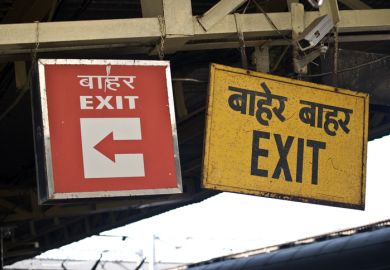Proposed guidelines that would allow non-academics to become vice-chancellors of Indian universities have been criticised by politicians and faculty members as central government overreach.
India’s University Grants Commission (UGC) has released draft regulations setting out new guidelines for the recruitment and promotion pathways of university faculty and leaders.
Shri Dharmendra Pradhan, the country’s education minister, said they would “infuse innovation, inclusivity, flexibility and dynamism in every aspect of higher education”.
The new document expands the eligibility criteria for vice-chancellors to include individuals with a background in industry and the public sector, rather than just academia.
The regulations also clarify that university chancellors – who are generally state governors, appointed by the central ruling party – will nominate the chair of the search committee and then choose the vice-chancellor out of the names recommended by the committee.
Critics say these new regulations will increase political interference in India’s universities, which has been a running concern under the Bharatiya Janata Party (BJP) government.
Writing on X, Jairam Ramesh, a senior leader of the Indian National Congress, India’s main opposition party, said the changes to the eligibility criteria for vice-chancellors were “fully intended to enable the appointment of RSS [Rashtriya Swayamsevak Sangh, a Hindu nationalist paramilitary organisation] apparatchiks in positions of power over academia”.
It comes as the central government continues to tussle with opposition state leaders for control over the appointment of university leaders. In some regions, universities have been left without vice-chancellors for an extended period of time as rows have descended into stalemate.
In January, Tamil Nadu’s state assembly adopted a resolution opposing the new guidelines and calling on the government to abandon them.
The UGC’s chair, Jagadesh Kumar, defended the change, saying the regulations provided “greater clarity” on vice-chancellor appointment processes. He also said expanding vice-chancellor eligibility to include non-academics was “in line with global trends in higher education”.
Furqan Qamar, professor of management at Jamia Millia Islamia and former secretary general of the Association of Indian Universities, said that politicisation of higher education was “at its zenith” in India.
Already, he said, “all kinds of people with political and ideological affiliation and backgrounds are getting appointed” as vice-chancellors, and the regulations may amplify this trend.
“If you get vice-chancellors who are beholden to the powers that be, then they will not ensure autonomy of the universities,” said Arun Kumar, a former professor of economics at Jawaharlal Nehru University (JNU). “The university faculty need autonomy to be able to generate new knowledge.
“And that’s what we’ve seen in JNU – that ever since this new regime has come, they’re packing faculty with the people with their ideological [stance], and the research [and] teaching has gone downhill as a result.”
The hiring criteria for faculty have also been updated, with prospective lecturers expected to fulfil four out of nine listed criteria. These include factors like “innovative teaching contribution”, “research or teaching lab development”, “experience as a principal investigator or co-principal investigator” as well as more niche criteria including having founded a registered start-up or conducted research in Indian knowledge systems.
Moushumi Basu, chair of JNU’s teachers’ association, said she found the criteria “very disturbing” as many were outside normal expectations of faculty. “You should be appointed on the basis of your academics,” she said.
She also questioned changes to requirements surrounding the NET test – a multiple-choice exam that prospective assistant professors are required to take – which will allow candidates to take the test in any subject of their choice, regardless of what they studied at undergraduate and postgraduate level.
“To be a teacher, you should at least have sufficient backing and sufficient knowledge of the subject that you want to teach,” she said.
The UGC is currently inviting feedback on the draft regulations, with the final version expected to be published later this year. If they come in as they are, Basu said, “it will be a disaster”.
Register to continue
Why register?
- Registration is free and only takes a moment
- Once registered, you can read 3 articles a month
- Sign up for our newsletter
Subscribe
Or subscribe for unlimited access to:
- Unlimited access to news, views, insights & reviews
- Digital editions
- Digital access to THE’s university and college rankings analysis
Already registered or a current subscriber?








